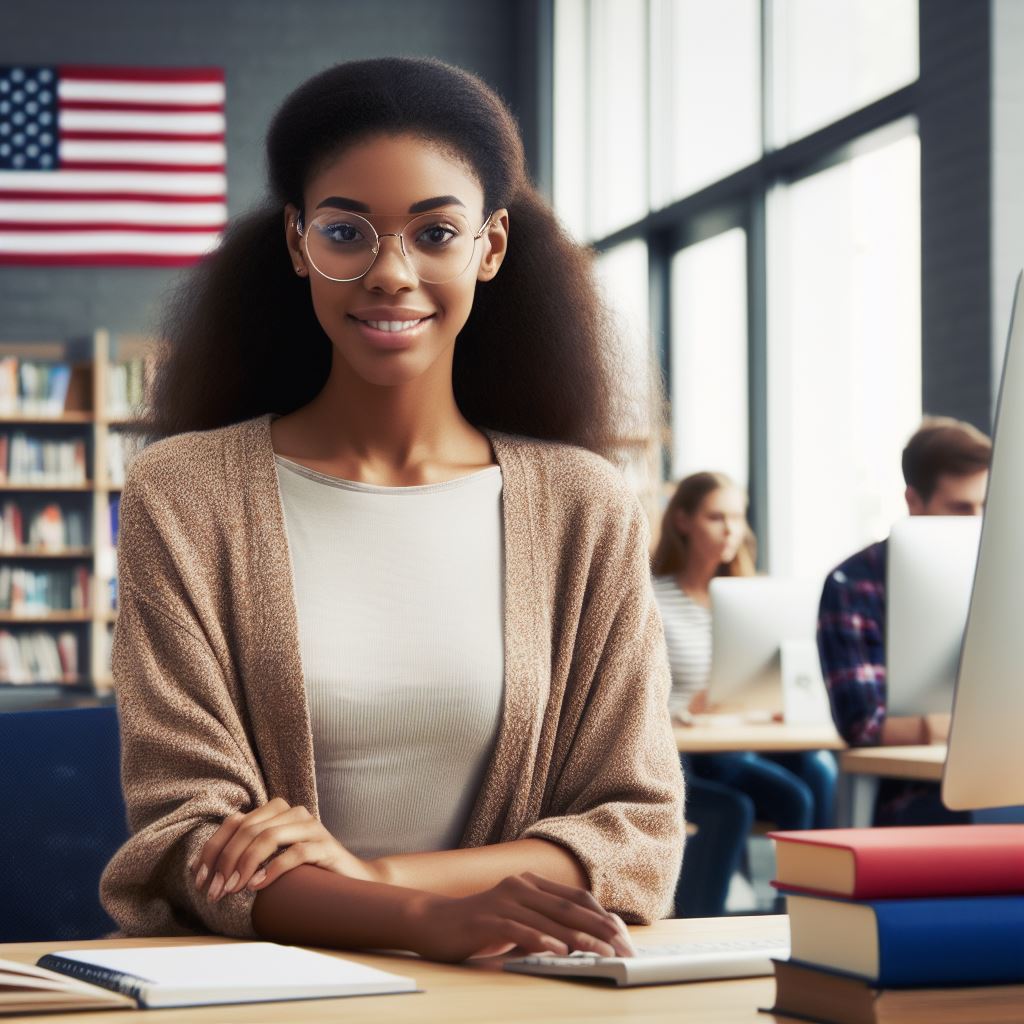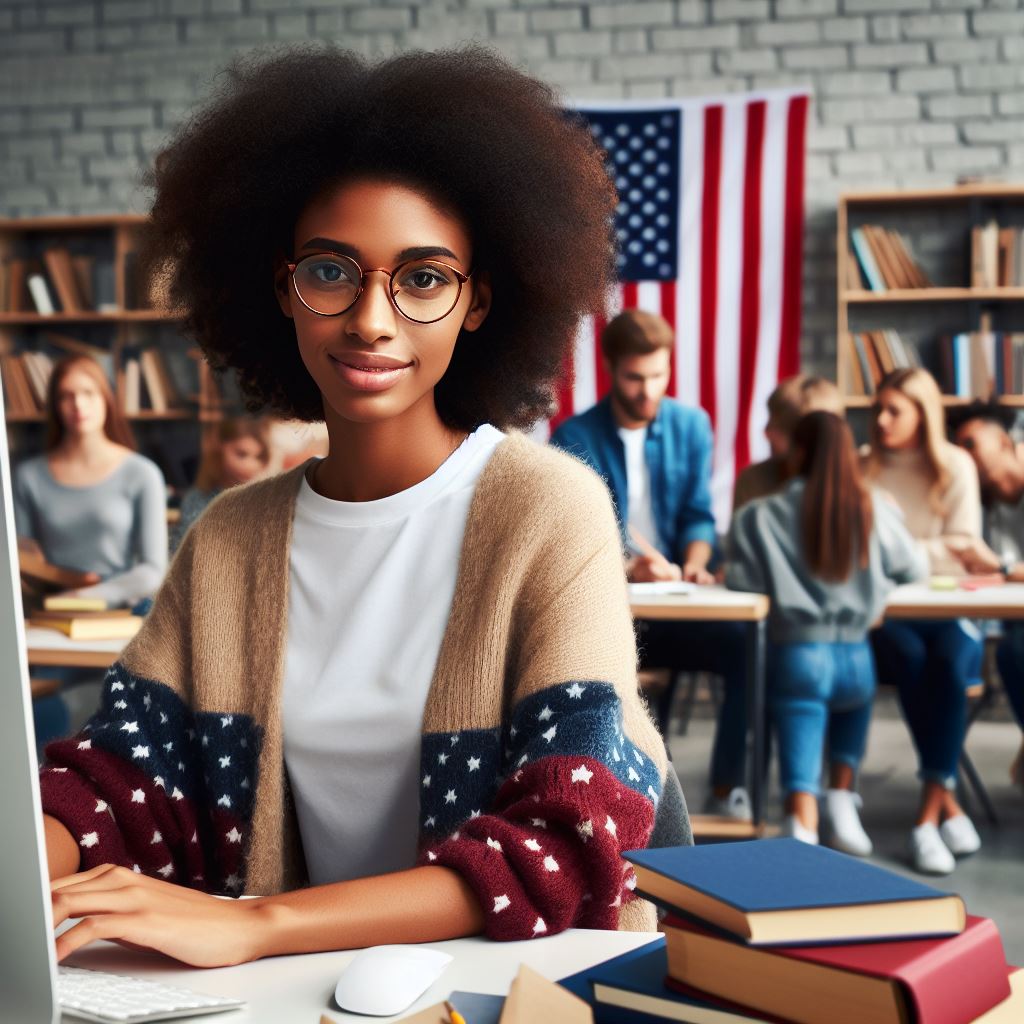Introduction
Librarians Role in US Public Education Systems is a pivotal role that often goes unnoticed.
They are the unsung heroes dedicated to enhancing student learning and literacy.
This essay highlights librarians’ vital roles in promoting literacy, fostering information literacy, and supporting curriculum integration.
Librarians foster a love for reading, curate diverse resources, and collaborate on engaging literacy programs.
Their expertise extends to teaching critical information skills and guiding students through the complexities of information sources.
Moreover, librarians collaborate with teachers, integrating library resources into lesson plans and providing crucial instructional support.
Librarians are instrumental in shaping students’ academic success within the US public education system, making multifaceted contributions.
Overview of US Public Education Systems
Brief history and development
- The establishment of public education systems in the US dates back to the early 19th century.
- Horace Mann, known as the “Father of American Public Schools,” played a significant role in their development.
- Initially, public education focused on basic literacy and numeracy skills.
- Over time, the education system expanded to include secondary education and vocational training.
- The passage of landmark legislation, such as the Smith-Hughes Act in 1917, brought about further advancements.
Current structure and organization
- The US public education system is administered at both the federal and state levels.
- Each state has its own education department responsible for implementing policies and overseeing schools.
- Public schools are typically organized into local school districts, each with its own governing board.
- There are also charter schools, which are publicly funded but operate independently.
- Many states offer public school choice options, including magnet schools and open enrollment programs.
Importance and challenges in the system
- Public education plays a fundamental role in a democratic society by ensuring equal access to education.
- It provides individuals with the knowledge and skills needed to participate effectively in society.
- However, the US public education system faces several challenges.
- Funding disparities between districts and within schools can lead to unequal educational opportunities.
- High-stakes standardized testing and accountability measures put pressure on students and educators.
- Societal issues, such as poverty and inequality, often affect students’ academic performance and well-being.
- Furthermore, the role of technology and its integration into classrooms pose new challenges for educators.
- Librarians play a crucial role in addressing these challenges and supporting the public education system.
In fact, understanding the overview of US public education systems is essential to comprehend the role of librarians.
With their expertise and resources, librarians help bridge educational gaps and enrich learning experiences for students across the nation.
Read: How to Break Into the Librarian Profession in the USA
Understanding the Role of Librarians
Definition and Responsibilities of Librarians in General
- Librarians are information professionals who assist patrons in locating and accessing resources.
- They organize and maintain library collections, ensuring easy retrieval of materials.
- Librarians offer guidance to users, helping them navigate through various resources and technologies.
- They provide reference services, answer queries, and assist with research.
- Librarians also conduct library instruction sessions, teaching users how to use library resources effectively.
- They play a critical role in preserving and archiving information, ensuring its long-term accessibility.
- Librarians monitor and evaluate the quality and relevance of resources to meet users’ needs.
- They collaborate with teachers and professionals to create educational programs and initiatives.
- Librarians constantly adapt to technological advancements and embrace digital resources.
- They promote information literacy, teaching users how to critically analyze and evaluate information.
Specific Role and Significance of Librarians in Public Education
- Librarians in public education systems serve as indispensable resources for students, teachers, and administrators.
- They provide a safe and conducive learning environment for students to explore and discover knowledge independently.
- Librarians collaborate with teachers to support curriculum objectives by providing relevant materials.
- They assist students in developing research skills and finding appropriate resources for academic projects.
- Librarians encourage a love for reading by recommending books and organizing engaging reading programs.
- They empower students with critical thinking skills, helping them navigate the vast information landscape.
- Librarians promote digital literacy, ensuring students are equipped with the necessary technology skills.
- They foster creativity and innovation by offering spaces for collaborative projects and access to multimedia resources.
- Librarians support personalized learning by offering tailored resources to meet individual student needs.
- They play a pivotal role in promoting diversity and inclusion through diverse collections and programming.
Evolution of Librarianship in Education
- Librarianship in education has evolved from mere custodians of books to dynamic information professionals.
- They have embraced technology and adapted their roles to meet the changing needs of students and educators.
- Librarians now curate digital resources and teach digital citizenship to ensure responsible information use.
- They have become innovators, creating maker spaces and incorporating emerging technologies into their libraries.
- Librarians actively collaborate with other educators, contributing to a multidisciplinary approach to education.
- They advocate for equitable access to information and resources for all students.
- Librarians take on leadership roles, influencing educational policies and curriculum development.
- They continue to adapt, staying up-to-date with new technologies and pedagogical approaches.
- Librarians play a vital role in promoting lifelong learning and fostering a culture of intellectual curiosity.
- They are crucial in preparing students for the challenges of the 21st century by providing essential skills.
Read: US Public vs. University Libraries: What’s the Difference?
How Librarians Support Student Learning
Providing resources and access to information
Librarians play a crucial role in ensuring students have access to diverse resources.
- They regularly update the library with new books, magazines, and digital sources.
- Librarians organize the materials in a systematic manner for easy access by students.
- They help students navigate complex databases and online platforms to find relevant information.
- Librarians also guide students in using reference materials to support their research projects.
Promoting information literacy skills
Librarians are instrumental in teaching students how to effectively evaluate and use information.
- They instruct students on differentiating between reliable and unreliable sources.
- Librarians educate students on proper citation and plagiarism, fostering academic integrity.
- They guide students to critically analyze information, promoting critical thinking skills.
- Librarians help students develop effective search strategies to locate accurate and relevant information.
Collaborating with teachers to enhance the curriculum
Librarians actively work with teachers to integrate library resources into the classroom.
- They collaborate with teachers to identify resources that align with lesson objectives.
- Librarians provide valuable input in selecting books and materials that cater to diverse student needs.
- They assist in creating engaging activities that connect classroom learning with library resources.
- Librarians also offer professional development to teachers, sharing best practices for utilizing library resources.
Fostering a love for reading and lifelong learning
Librarians play a pivotal role in cultivating a passion for reading and continuous learning.
- They create a welcoming and inviting environment that promotes a love for reading.
- Librarians organize book clubs, author visits, and story hours to engage students.
- They recommend age-appropriate books and provide personalized reading suggestions.
- Librarians celebrate reading milestones and achievements, encouraging a lifelong love for learning.
In short, librarians are essential in supporting student learning in US public education systems.
Librarians contribute to students’ academic success by providing resources, promoting information literacy, collaborating with teachers, and fostering a love for reading.
Librarians’ dedication and expertise are invaluable assets in education, providing students with tools and support for academic success.
Read: Challenges and Opportunities: Being a US Librarian Today

Challenges and Opportunities for Librarians in Public Education
Funding and budget limitations
- Librarians in public education face the challenge of inadequate funding.
- Financial constraints impede the ability to acquire new books and resources.
- Limited budgets also hinder the maintenance and updating of library technologies.
- Despite the challenges, librarians find opportunities to creatively maximize available resources.
- They seek grants, partnerships, and community support to supplement funding shortfalls.
Technological advancements and digital resources
- Rapid technological advancements necessitate librarians to adapt their roles.
- They must stay updated on emerging technologies to provide relevant resources.
- Librarians embrace digital resources and online platforms to enhance learning opportunities.
- They teach students critical digital literacy skills and promote responsible use of technology.
- Efficient integration of technology enhances engagement and expands access to information.
Ensuring equitable access to information
- Librarians play a vital role in ensuring all students have equitable access to information.
- They strive to create inclusive and diverse library collections that reflect their student population.
- Librarians collaborate with teachers to address educational disparities and support underprivileged students.
- They develop programs and initiatives that promote equitable information access for all.
- By fostering inclusivity, librarians empower students with knowledge and expand their horizons.
Advocating for the importance of libraries in education
- Librarians face the ongoing challenge of advocating for the significance of libraries.
- They emphasize the vital role of libraries in fostering a love for reading and lifelong learning.
- Librarians engage in outreach activities to highlight the value of their services.
- They collaborate with stakeholders to demonstrate the positive impact of libraries on academic achievement.
- By advocating for libraries, librarians ensure their continued presence in education systems.
Despite these challenges, librarians in public education systems have many opportunities.
Transform Your Career Today
Unlock a personalized career strategy that drives real results. Get tailored advice and a roadmap designed just for you.
Start NowThey can creatively stretch limited budgets, adapt to technological advancements, champion equity, and advocate for libraries.
Through their dedication and innovative approaches, librarians continue to play an invaluable role in shaping the education and future of students.
Success Stories and Examples of Effective Library Programs
In this section, we will explore success stories and examples of effective library programs in US public education systems.
These stories highlight the positive influence and impact that librarians have on student achievement.
Case studies of schools with thriving library programs
One inspiring case study is Jefferson Elementary School in California.
Through their dedicated library program, they managed to increase student reading scores by 20%.
This success demonstrates the crucial role librarians play in improving literacy levels.
Another example is Lincoln High School in Texas. After implementing a library program, they saw a remarkable 30% decrease in dropout rates.
This showcases how a well-developed library program can positively impact student engagement and retention.
Maple Grove Middle School in Minnesota also experienced the benefits of a thriving library program.
Students at this school showed significant improvement in their research skills, thanks to the guidance and resources provided by their librarian.
Innovative approaches and initiatives
Libraries are evolving to meet the changing needs of students and communities. One innovative approach is the “Library on Wheels” program.
This initiative brings books and resources to underserved communities, ensuring that everyone has access to the advantages libraries offer.
Digital libraries and online resources are also becoming increasingly popular.
These platforms provide 24/7 access to a vast range of materials, supporting independent learning and research for students and teachers alike.
Libraries are also forging partnerships with local businesses and organizations.
By collaborating, librarians can bring real-world experiences, such as guest speakers and internship opportunities, to their libraries.
This approach helps students connect their learning to the outside world.
Demonstrating the impact of librarians on student achievement
Multiple studies have attested to the positive impact of librarians on student achievement.
Showcase Your Business Today
Reach thousands of readers actively exploring professional services. Publish your business profile and grow your audience now.
Publish Now- The American Library Association conducted research, revealing that schools with certified librarians consistently had higher reading scores.
- This data underscores the vital role librarians play in fostering literacy skills.
- Librarians are essential in teaching information literacy skills.
- They guide students in navigating an overwhelming amount of information and help them develop critical thinking abilities.
- Additionally, librarians foster a love for reading by recommending books tailored to students’ interests, further enhancing their overall academic growth.
- The presence of librarians in schools has also been linked to higher graduation rates.
- These experts empower students with skills and resources for academic success, preparing them for higher education and future careers.
In essence, success stories and examples of effective library programs demonstrate the significant impact of librarians on student achievement.
This section underscores the indispensable role of librarians in US public education through case studies, innovative approaches, and demonstrated impact.
Read: Librarian Education and Certification Requirements in the US
Conclusion
Librarians play a crucial role in the US public education system.
The importance of librarians cannot be overstated, as they provide information literacy skills and resources that are vital for student success.
As society becomes more reliant on technology, librarians adapt and continue to be at the forefront of education, ensuring that students have the necessary tools to thrive.
From promoting reading and fostering a love for learning to assisting with research and supporting academic development, librarians are indispensable.
They create safe spaces for students to explore their interests, encourage critical thinking, and empower them to become lifelong learners.
Librarians collaborate with educators, administrators, and parents, serving as a bridge between schools and communities.
They go above and beyond their traditional roles, organizing literacy programs, providing digital access, and promoting inclusivity and diversity.
In a changing world, librarians play a vital role in guiding students through vast information, fostering skills for academic and personal growth.
As technology continues to advance, librarians remain the guardians of knowledge, ensuring that all students have equal access to information.
It is through the dedicated efforts of librarians that students can become critical thinkers, problem solvers, and active participants in their own education.
In closing, librarians are the heart of public education systems, shaping the minds of future generations and empowering them to make a difference in the world.
[E-Books for Sale]
The Big Book of 500 High-Paying Jobs in America: Unlock Your Earning Potential
$19.99 • 500 High-Paying Jobs • 330 pages
Explore 500 high-paying jobs in America and learn how to boost your career, earn more, and achieve success!
See All 500 High-Paying Jobs of this E-Book
1001 Professions Without a Degree: High-Paying American Jobs You Can Start Now
$19.99 • 1001 Professions Without a Degree • 174 pages
Discover 1001 high-paying jobs without a degree! Unlock career tips, skills, and success strategies for just $19.99!




